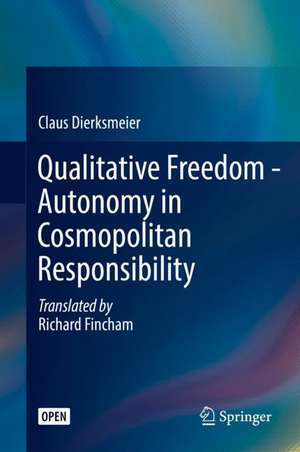Qualitative Freedom - Autonomy in Cosmopolitan Responsibility
Autor Claus Dierksmeier Traducere de Richard Finchamen Limba Engleză Hardback – 29 ian 2019
Open societies worldwide have come under increasing pressure in the last decades. The belief that politics and markets fare best when guided by the principle of liberty presently faces multiple challenges such as terrorism, climate warming, inequality, populism, and financial crises. In the view of its critics, the idea of freedom no longer offers adequate guidance to meet these challenges andshould be partially corrected or even entirely replaced by countervailing values. Against the reduction of freedom to the merely quantitative question as to how much liberties individuals call their own, this book draws attention to the qualitative concerns which and whose opportunities society should foster. It argues that, correctly understood, the idea of liberty commits us to defend as well as advance the freedom of each and every world citizen.
Preț: 433.47 lei
Nou
Puncte Express: 650
Preț estimativ în valută:
82.96€ • 85.70$ • 69.04£
82.96€ • 85.70$ • 69.04£
Carte tipărită la comandă
Livrare economică 26 martie-09 aprilie
Preluare comenzi: 021 569.72.76
Specificații
ISBN-13: 9783030047221
ISBN-10: 3030047229
Pagini: 376
Ilustrații: X, 365 p. 2 illus.
Dimensiuni: 155 x 235 x 22 mm
Greutate: 0.7 kg
Ediția:1st ed. 2019
Editura: Springer International Publishing
Colecția Springer
Locul publicării:Cham, Switzerland
ISBN-10: 3030047229
Pagini: 376
Ilustrații: X, 365 p. 2 illus.
Dimensiuni: 155 x 235 x 22 mm
Greutate: 0.7 kg
Ediția:1st ed. 2019
Editura: Springer International Publishing
Colecția Springer
Locul publicării:Cham, Switzerland
Cuprins
Chapter 1 Introduction.- Chapter 2 Metaphysics of Freedom.- Chapter 3 Quantitative Freedom.- Chapter 4 Qualitative Freedom.- Chapter 5 Conclusion.- Acknowledgments.- Literature.
Notă biografică
Prof. Dr. Claus Dierksmeier is Professor for Globalization Ethics at the University of Tübingen in Germany. His areas of expertise and academic work include political, economic, and religious philosophy with a particular focus on the theories of freedom and responsibility in the age of globality.
Recent book publications include:
Qualitative Freiheit: Selbstbestimmung in weltbürgerlicher Verantwortung
Reframing Economic Ethics: The Philosophical Foundations of Humanistic Management
Recent book publications include:
Qualitative Freiheit: Selbstbestimmung in weltbürgerlicher Verantwortung
Reframing Economic Ethics: The Philosophical Foundations of Humanistic Management
Textul de pe ultima copertă
In the light of growing political and religious fundamentalism, this open access book defends the idea of freedom as paramount for the attempt to find common ethical ground in the age of globality. The book sets out to examine as yet unexhausted ways to boost the resilience of the principle of liberalism. Critically reviewing the last 200 years of the philosophy of freedom, it revises the principle of liberty in order to revive it. It discusses many different aspects that fall under its three main topics: the metaphysics of freedom, quantitative freedom and qualitative freedom.
Open societies worldwide have come under increasing pressure in the last decades. The belief that politics and markets fare best when guided by the principle of liberty presently faces multiple challenges such as terrorism, climate warming, inequality, populism, and financial crises. In the view of its critics, the idea of freedom no longer offers adequate guidance to meet these challenges and should be partially corrected or even entirely replaced by countervailing values. Against the reduction of freedom to the merely quantitative question as to how much liberties individuals call their own, this book draws attention to the qualitative concerns which and whose opportunities society should foster. It argues that, correctly understood, the idea of liberty commits us to defend as well as advance the freedom of each and every world citizen.
Open societies worldwide have come under increasing pressure in the last decades. The belief that politics and markets fare best when guided by the principle of liberty presently faces multiple challenges such as terrorism, climate warming, inequality, populism, and financial crises. In the view of its critics, the idea of freedom no longer offers adequate guidance to meet these challenges and should be partially corrected or even entirely replaced by countervailing values. Against the reduction of freedom to the merely quantitative question as to how much liberties individuals call their own, this book draws attention to the qualitative concerns which and whose opportunities society should foster. It argues that, correctly understood, the idea of liberty commits us to defend as well as advance the freedom of each and every world citizen.
Caracteristici
This book is open access Shows that liberty is by no means tantamount to license and irresponsible, self-centred behaviour First philosophically coherent inclusion of the concerns for social, moral, and ecological sustainability into freedom theory Shows how both camps of liberal philosophers have and can recapture common ground in defending the model of the open society Draws attention to the qualitative concerns which and whose opportunities society should foster Broadens the current discussion on freedom for intercultural contributions
